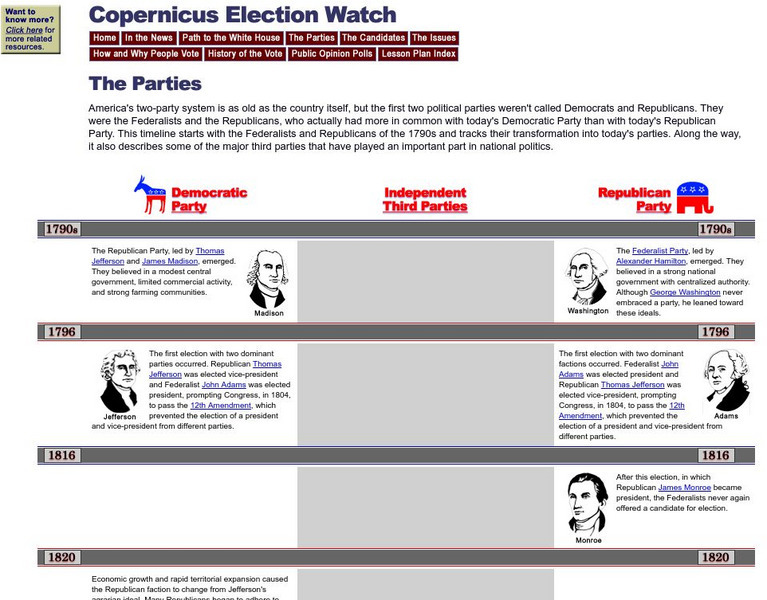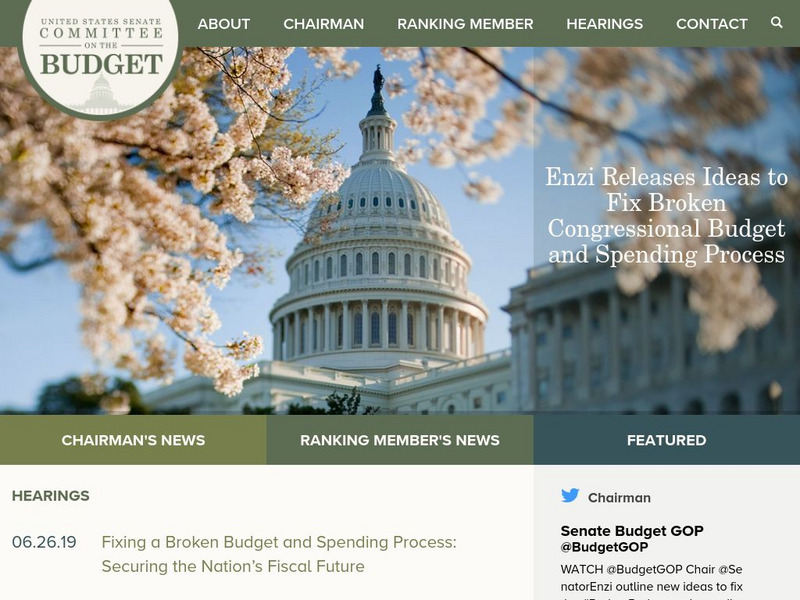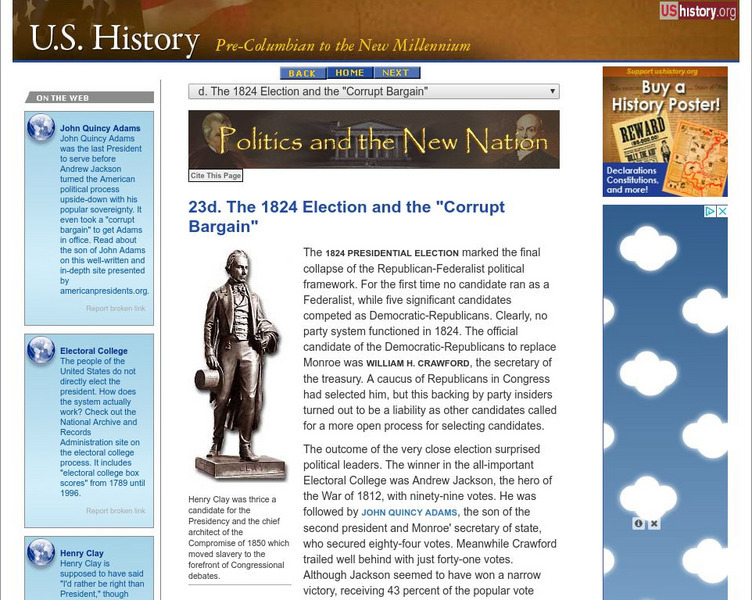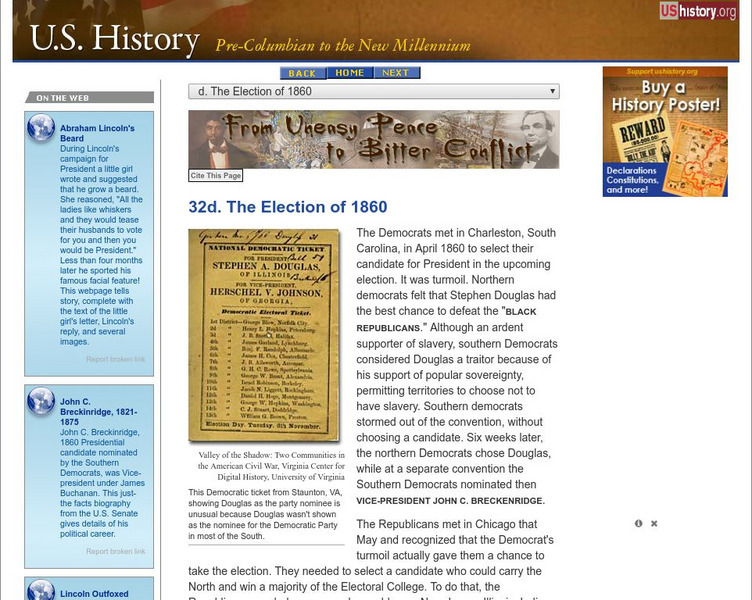Harp Week
Harp Week: Presidential Elections: 1908 Taft v. Bryan Overview
What a great resource this is. The four-page oveview of the campaign of 1908 begins with a review of the presidency of Theodore Roosevelt. Read about the nomination of William Howard Taft, Roosevelt's acolyte, sure to carry on the...
University of Virginia
Ua: The New Deal for African Americans
Short essay discussing how the programs of the New Deal changed the African American political support from Republican to Democrat. Includes photo.
CNN
Cnn: 10 Ways a Government Shutdown Will Affect Your Daily Life
With the deadlock between Republicans and Democrats over Obamacare, the government had to shut down in 2013. This article explains the ramifications of this for the average American. (Published: October 1, 2013)
Ohio State University
Temperance & Prohibition: Prohibition Party Cartoons
A great collection of political cartoons from the Prohibition Party which heaped criticism on both the Republican and Democratic parties concerning their lack of support for prohibition. Find out when the Prohibition Party was at its...
Ohio State University
Ohio State University: Think Political News Is Biased? Depends Who You Ask
Article about Ohio State University study that explores whether Republicans or Democrats think political news is biased. (Published April 7, 2003)
Other
President Elect: 1908
An overview of the candidates for president in the election of 1908 in which the primary candidates were William H. Taft, William Jennings Bryan, and Eugene V. Debs. The electoral map shows how split the country was between Republicans...
American Rhetoric
American Rhetoric: Margaret Chase Smith: "Declaration of Conscience"
This is the text of Senator Margaret Chase Smith's "Declaration of Conscience," a list of how Republicans and Democrats should act, delivered on June 1, 1950.
Other
Copernicus Election Watch: History of the Parties
This site has a great timeline that tracks the history of the Democratic, Republican, and some Independent Third Parties. Also some excellent links at the bottom of the page.
PBS
Pbs News Hour: Lesson Plan: The Presidential Nominating System
This lesson plan may be used to introduce students to the system of primaries and caucuses by which candidates for U.S. president are nominated by their parties. After completing this lesson plan, students will understand the process by...
The Dirksen Congressional Center
Congress for Kids: Elections: National Conventions
The Democrats and Republicans hold huge national conventions every four years, and all of the states participate. Learn about the importance of this special event.
PBS
Pbs Learning Media: Elections 1896 & 1900: Interactive Map: Biography of America
This interactive map and video from A Biography of America will help compare how key issues in the elections of 1896 and 1900 influenced geographical patterns in both presidential and congressional election results. Although the...
Other
Encyclopedia of Arkansas: Redeemers (Post Reconstruction)
Read about the so-called Redeemers, whose actions returned the Democratic Party to power in the southern states at the end of Reconstruction. Find out how they rolled back the legislation put into effect by the Republicans as a result of...
US Senate
Us Senate Budget Committee
Use this resource to learn more about the Senate Budget Committee. It is divided into two parts. The first is a Republican website and the second is a Democratic website.
PBS
Pbs News Hour: Lesson: The Presidential Nominating System
This instructional activity may be used to introduce students to the system of primaries and caucuses by which candidates for U.S. president are nominated by their parties. After completing this instructional activity, students will...
Independence Hall Association
U.s. History: The 1824 Election and the "Corrupt Bargain"
The two-party system in presidential elections fell apart in the election of 1824. See what happened when five men, all from the Democratic-Republican Party, ran against each other. Find out why the choice of John Quincy Adams was called...
Independence Hall Association
U.s. History: Two Parties Emerge
Although George Washingon denounced the creation of political parties, they came roaring into play in the election of 1796 in which John Adams, representing the Federalists, ran against Thomas Jefferson, who represented the...
University of Virginia
Miller Center at Uva: u.s. Presidents: William Mc Kinley: The Campaign and Election of 1896
Read about the campaign of 1896 in which William McKinley represented the Republican Party and William Jennings Bryan the Democratic Party. One big issue was the contrast between the use of the gold standard as opppsed to free silver.
Other
Politics 1: Presidency 2004
Site presents presidential candiadates for the 2004 election for the Republican Party, the Democratic Party, and each of the Third Parties.
Alabama Learning Exchange
Alex: Elephant or Donkey?
Students will visit the websites for the National Republican and National Democratic Party. Students will choose topics of interest to them and compare the positions of both parties on the topic. Students will complete a graphic...
Khan Academy
Khan Academy: Us History: 1800 1848: The Election of 1800
The growing partisanship between the Federalist camp, led by John Adams, and the Democratic-Republican camp, led by Thomas Jefferson, resulted in a bitterly contested presidential election in 1800.
Independence Hall Association
U.s. History: The Election of 1860
The election of Abraham Lincoln in 1860 was a watershed moment for the union of the country. Read about the political conventions, several candidates, and the votes that were split among them. Find a map that shows how the electoral...
Other
Vanderbilt University: Television News Archive
This archive from Vanderbilt University contains an "extensive and complete" collection of television news broadcasts. "The collection holds more than 30,000 individual network evening news broadcasts from the major U.S. national...
University of Virginia
Univ. Of Virigina: The New Deal for African Americans
Resource provides an essay describing the African Americans changing of political support from Republican to Democrat in the 1930's. Includes exerpt from archived news article.
Then Again
Then Again: Web Chron: The Compromise of 1877
Discusses the Compromise of 1877 between the Republicans and Democrats, which was the solution to the contested Presidential election of 1876. It also brought an end to the period of Reconstruction following the Civil War.
















